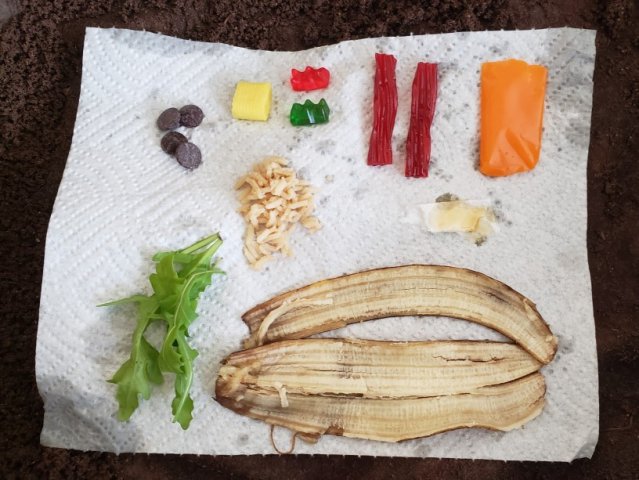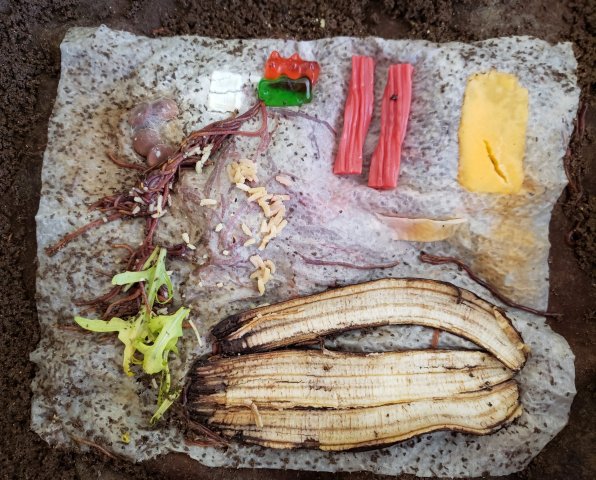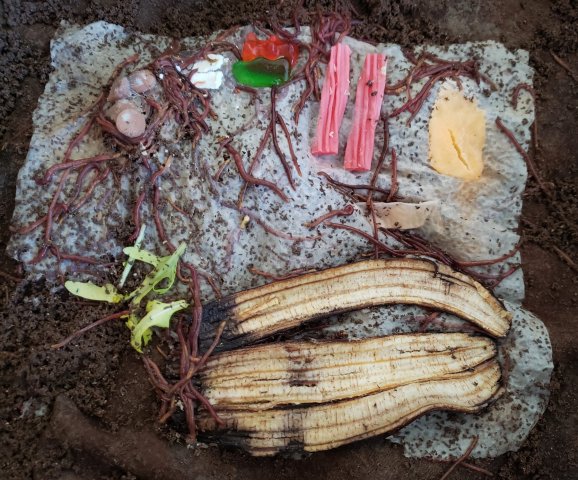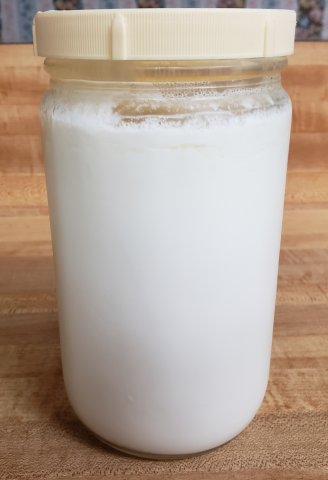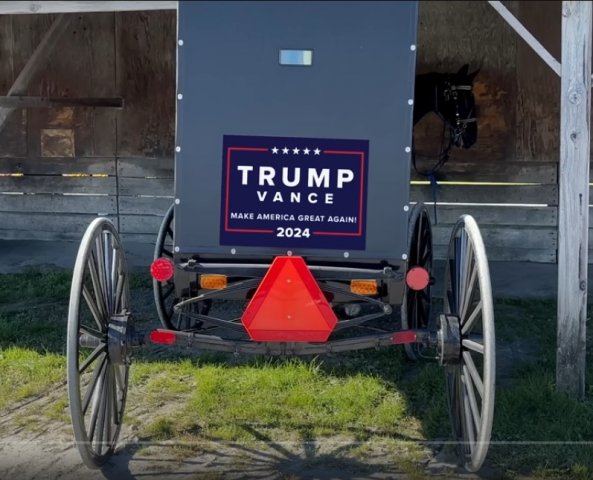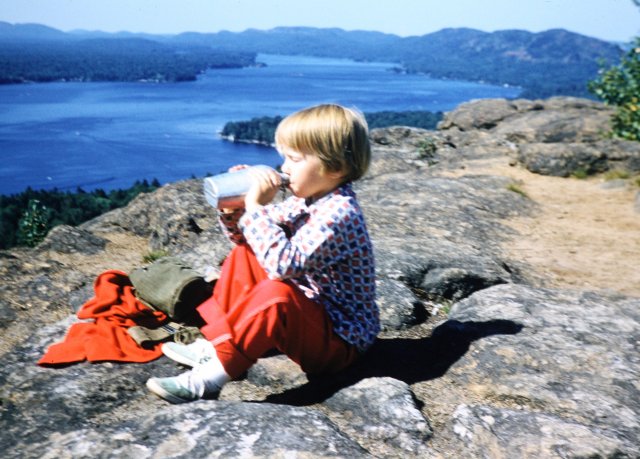Forevergreen is a new, short, animated film. I know nothing about it except that a friend recommended it, and I found it enjoyable and moving. I belive this preview (of the entire film) will only be available for free for a week, so if you're interested, watch it soon. It's 13 minutes long.
Permalink | Read 417 times | Comments (1)
Category Children & Family Issues: [first] [previous] [newest] Conservationist Living: [first] [previous] Inspiration: [first] [previous] [next] [newest]
As I wrote in Let the Worms Decide, I decided to do my own experiment on what our composting worms think of junk food.
I began the experiment with the worms "hungry"; I had let the available food dwindle 'way down in hopes of increasing their willingness to accept my offerings. I placed a clean paper towel on top of the moisture mat for greater visibility for the camera; normally their food goes under the mat, but I knew the clever little creatures would find it. From left to right, top to bottom: chocolate chips (60% cacao), a Starburst candy, two gummy bears, two Hallowe'en-sized Twizzlers (strawberry), an Airheads candy, brown rice, a piece of paper towel soaked with local, raw honey, some arugula, and a banana skin.
Four days later, the chocolate chips had apparently begun to mold, and the Starburst was completely covered in it. The other candy had softened and faded, but was untouched. The rice was very popular, but it's hard to tell what they thought of the honey. The arugula showed a small amount of interest, and there was some activity at one end of the banana skin.
After seven days I took pity on the worms and ended the experiment so I could give them a larger quantity of food I know they like. As you can see, there was a lot more worm activity. The rice was completely gone, and there had obviously been a lot of action around the arugula and the end of the banana (note all the worm castings). The chocolate showed a reasonable amount of interest and there were a number of worms around the candy—but they may have been munching on the paper towel. The Airhead seems to have been totally ignored.
It's hard to draw any firm conclusions. The worms can't really eat many items until the bugs and microfauna have done their pre-processing work, and some foods may take longer than others. I don't know why the arugula went so slowly; usually greens go quickly, but perhaps arugula is too "spicy" for the worms—I know they don't like the strong-flavored lemon balm.
I would have thought that the candy, being mostly sugar, should have been easy for them to handle. But I was wrong. According to my Brave browser's AI,
Red wiggler worms should not eat candy. Candy is high in sugar and often contains oils, artificial ingredients, and other additives that can harm the worms or disrupt the balance of the composting environment. While red wigglers can consume a variety of organic matter, including fruits and vegetables, they should not be fed processed foods like candy, cookies, or cake, as these can lead to poor bin conditions and attract pests.
So there you go. Ultra-processed foods are bad for worms, and probably for people, too. Then again, chocolate is bad for dogs, they say, and good for people (in limited quantities), so make your own decisions.
"Let the Worms Decide" is an Epoch Times article that caught my eye first because of the author, Joel Salatin, and secondly because I knew what kind of worms he was talking about. We've been vermicomposting since 2009, and I know a little bit about what our worms will and will not eat.
Salatin begins with a story from a middle school program he visited in California, where students worked on a small farm half a day each week.
They had a worm box about 8 feet by 3 feet by 3 feet. Imagine an oversized coffin. If you want to see children get excited, show them a worm box. It’s mesmerizing with all the slithering, slimy worm activity....
One week, the farmers assigned homework: “Bring food on Monday.” The students dutifully brought some food: Twizzlers, Gummy Bears, Froot Loops—you get the idea. They placed their “food” in one end of the worm box. The farm ladies put different items in the other end: an apple, a pork chop, and a glob of yogurt, among other things. The following week, the students, eager to see what had transpired, ran to the box and opened it.
They pulled out their Gummy Bears, Twizzlers, and Froot Loops—untouched. When they tried to find the food items that the farmers had placed at the other end, all that food was gone. The day’s lesson was obvious: “Why would you want to eat something worms won’t even eat?” I'll bet a lot of young people made some different eating decisions that day.
Tongue not totally in cheek, Salatin proposes turning our expensive—and too-easily corrupted—food safety testing over to composting worms.
I’ve known and worked with many worm farmers over the years who explain how sensitive their “livestock” is to unacceptable items placed in their boxes. If they like the substance, they devour it readily. If they don’t, they move away and give it a wide berth.
If worms are that decisive and timely to determine healthy versus unhealthy things in their environment, why not ask them to share their preferences with all of us?
Worms don’t vote, don’t listen to lobbyists, don’t invest in Wall Street, or watch ads. They are about as objective a researcher as you could ever want. Goodness, they aren’t even swayed by money.
Here’s my idea: why not get a small plot of land—perhaps 5 acres—and set up 100 worm boxes? Everything Americans apply to the soil or put in our mouths would undergo the worm test for a week. What the worms ate would get a green light. What the worms didn’t eat would get a red light.
We could hire a couple of college students to run the program. If glyphosate is really innocuous, let’s see if the worms like it. If Coca-Cola is really nutritious, let’s see if the worms like it. Pour it in and see if they want to come to that area, or if they avoid it like the plague. If Red Dye 29 is a wonderful food additive, or monosodium glutamate (MSG), put them in the worm bed and let the worms vote.
Based on my experience, I see a few problems with this scenario, as I'm sure Salatin himself does. Worms will eat (and detoxify) some really nasty things, given enough time for their cohabiting microorganisms to break them down. The farmers who sold us our system have huge vermiculture setups in which they say the worms will devour battery acid in small quantities. Just because you can convince a worm to eat something, that doesn't mean I want it in my food. But the one-week test would probably take care of that problem. Maybe the worms will eventually eat something, if they get hungry enough, but they definitely have their favorites and, like a small child at the dinner table, will go for the good stuff first.
That same small child may reject his beets despite their certified goodness, and my worms will reject things I find great. Like homegrown, organic lemon balm. Or citrus peels. (Granted, I never tried them on the chocolate-covered variety.) Some worms don't like broccoli; fortunately, ours eat it right up. So it's not a foolproof system.
That said, Salatin makes an important point: If something we're doing causes natural systems to thrive, that could be a clue that we may be going in the right direction. On the other hand, a failing system is a red warning light that should give us pause.
Stay tuned for the results of my own experiment. We have leftover Hallowe'en candy, including the above-mentioned Twizzlers. I plan to make an offering to the worms and see what they have to say.
Permalink | Read 463 times | Comments (1)
Category Education: [first] [previous] [next] [newest] Health: [first] [previous] [next] [newest] Politics: [first] [previous] [next] [newest] Food: [first] [previous] [next] [newest] Conservationist Living: [first] [previous] [next] [newest]
It began as a student project by Professor Jamie Rector's class at the University of California, Berkeley. They wanted to investigate methane emissions from abandoned and sealed oil wells. What the students discovered could turn the approach to California's environmental concerns on its head.
As they researched California’s abandoned oil wells, Rector’s students discovered an abundance of natural oil seeps located above the same fields—and came to a surprising conclusion. Geologically driven, natural oil seeps are a major contributor to California’s greenhouse emissions, they say. And drilling—long seen as the problem, not the answer—might be a panacea for emissions.
Natural seeps occur when liquid oil and gas leak to the Earth’s surface, both on land and under water. California sits on actively moving tectonic plates, which create fractured reservoirs and pathways for the oil to escape. ... Waters off Southern California are rife with seeps, and oil and gas fields ... have some of the highest natural hydrocarbon seep rates in the world, emitting gases such as methane, as well as toxic volatile organic compounds (VOCs). But these geologically driven seeps, Rector notes, have been largely unaccounted for in assessing how oil production fields contribute to California’s greenhouse gas emissions.
“There are hundreds of studies linking oil and gas fields to greenhouse gas emissions, to cancer rates, to climate justice, to groundwater pollution and everything else,” said Rector. “And yet none of these studies ever considered the possibility that it wasn’t from equipment or production, but natural seeps above the oil fields.” ... Rector’s team calculates that natural seeps, together with orphaned wells, produce 50 times more methane emissions than oil and gas equipment leaks in Southern California.
If seeps are driving emissions above oil fields, Rector reasons, plugging abandoned wells may do little to help pollution. In fact, he posits, the only demonstrated way to reduce natural seep emissions is by depleting underlying reservoirs—that is, by drilling.
Pointing to studies showing that oil production has reduced and even eliminated seeps, he suggests California’s current regulatory environment may be counterproductive.
“The crazy thing is, by stopping oil and gas production in California, after we’ve regulated and really gotten equipment emissions way down, we may be increasing seep emissions,” Rector said. “Because these seeps come up through the oil and gas fields, and the only way to stop it is by producing oil.”
The article is much longer than these excerpts, and the situation is of course complex, both scientifically and politically, but I see it as yet another demonstration of the truth that simplistic solutions with the best of intentions often lead to harmful, unintended consequences.
Here's an interesting look at attempts to replace farms and ranches with industrial food production facilities.
I'm not totally against efforts to use technology to create flesh; I'm quite excited about the possibility of using 3D printers to create hearts, kidneys, and other organs for those who need them. That, too, is still a far-off dream, but it sure beats re-defining death so that more organs can be harvested for transplant, as was recently suggested in the New York Times. (The link will be useless to you if, like me, you can't get into the NYT, but you can see the headline.)
The main reason I like that video is how it reveals the incredible complexities of natural life, which we take for granted until we try to mimic them. Lab-grown meat is no more likely to replicate—in taste or nutrition—a fire-grilled steak from a purely grass-fed steer than vanillin can replace a vanilla bean, or oat milk the marvellous liquid that comes from a well-tended cow.
Permalink | Read 1572 times | Comments (0)
Category Health: [first] [previous] [next] [newest] Food: [first] [previous] [next] [newest] Conservationist Living: [first] [previous] [next] [newest] Here I Stand: [first] [previous] [next] [newest]
There are a lot of things about the good ol' days that I don't miss—smoking on airplanes is at the top of the list—but recently I was gloriously reminded of one of the benefits that we took for granted at the time: good showers.
I don't think anyone born after 1990 has any idea what a good shower feels like. For almost 25 years it has taken me twice as long as previously to take a shower, because the flow from today's emasculated nozzles is so weak. Maybe if you've stood under a waterfall, or a tropical rainstorm, you have an idea of the joy of a shower free from unnecessary regulation, but it's pure bliss after all this wimpy stuff, let me tell you.
As I stood under the shower, the thought crossed my mind: I know President Trump has a lot of more important things to think about, but I sure wish he'd get rid of the shower head restrictions.
I thought it was just a useless wish. But like my similar dreams that companies would get rid of the junk that fills much of our food, or that someone would take seriously the catastrophic rise in allergies, autism, ADHD, and other afflictions that have replaced measles, mumps, and chicken pox as parental concerns. But at last, we as a country are attempting to address those and other long-time concerns of mine, so I though maybe shower heads had a chance.
Lo and behold, today I learned that President Trump has already rescinded—not the original 1992 regulation of showerheads, which I would have preferred, but at least the subsequent re-interpretations of the rules that were considerably more onerous. I'll celebrate victories when I see them.
There are many ways to conserve resources. One size fits all rarely works well. I'll take shorter, more powerful showers; you're welcome to take longer, wimpier ones.
Maybe it's time to stimulate the economy by buying new showerheads. As long as they're made in America.
Make showers great again!
Permalink | Read 844 times | Comments (0)
Category Politics: [first] [previous] [next] [newest] Random Musings: [first] [previous] [next] [newest] Everyday Life: [first] [previous] [next] [newest] Conservationist Living: [first] [previous] [next] [newest] Glimpses of the Past: [first] [previous] [next] [newest]
Mike Wimmer is 16 years old, loves cars and video games, recently earned his PhD, started doing contract work for the United States Special Operations Command at age 10, and has a viable technology, with a working prototype, that could help save our endangered coral reefs.
“I always had an innovative mindset and the idea to want to solve challenges with new technologies,” he said, adding that he pushed himself “to go even farther, even faster, even better.” He wants his work to “have a positive impact on the world.”
I'd love to see him collaborate with Elon Musk. Although, given Wimmer's own predilection for entrepreneurship, he probably has it in him to become Musk's nearest competitor.
Wimmer’s latest underwater gambit is one in a series of robotics and AI startups under his belt. He’s been building companies since age 10, including Next Era Innovations.
Here's the Epoch Times article on Mike Wimmer; there's more available online, but if you search for him don't get confused by the artist of the same name.
Permalink | Read 822 times | Comments (0)
Category Random Musings: [first] [previous] [next] [newest] Conservationist Living: [first] [previous] [next] [newest] Inspiration: [first] [previous] [next] [newest]
This is my dream garden. It's not an achievable dream at this point in my life, and even if I were much younger, there's a lot more to creating a system like this than he discusses. It's not so much a garden as a very small farm (albeit this one is in suburban Long Island), and requires farm-level work. For one thing, you can't decide to go out of town without arranging for someone to care for your plants and animals. It's like being a pet owner, only a lot more intense—you can't pack up your chickens and take them to a kennel, and neighbors who will happily feed your cat might draw the line at milking goats.
If this is ever going to be your dream, it's probably easiest to start dreaming early in life, when you're making decisions about family, employment, and home location.
Nonetheless, there's a lot of inspiration to be gained from Mike G.'s experience, especially in seeing how much he accomplished in under five years of consistently pursuring his goal, taking one step at a time, and learning along the way.
Permalink | Read 788 times | Comments (0)
Category Health: [first] [previous] [next] [newest] Food: [first] [previous] [next] [newest] Conservationist Living: [first] [previous] [next] [newest] Inspiration: [first] [previous] [next] [newest]
I often hesitate to share articles from the Epoch Times, because although many of them are free to read, some people have been put off by the requirement to enter an e-mail address. I understand, and am grateful that I have an infinite supply of e-mail addresses to use—and thus to block if they start generating spam. (One of the blessings of having your own domain.) However, there are many articles worth sharing, so I'm going to start posting some of them for those who aren't turned away by the requirement for an address (assuming they are still doing that).
From Veganism to Vitalism: Why I Left Industrial Plant-Based Culture for Real Food, Real Soil, and Real Community, by Mollie Engelhart, warmed my heart for the same reasons Polyface Farms and Joel Salatin have impressed me so much. To whet your appetite, here are a few quotations from the article.
My commitment to the environment led me to start my own farm as a way to manage the food waste from my restaurants. I was the founder and executive chef of Sage Vegan Bistro, which eventually became Sage Regenerative Bistro. I wanted to close the loop—grow the food, feed the people, compost the scraps, and build healthy soil. But the deeper I got into that system, the more I began to see the cracks in the story I had believed so fully.
Living on the land and growing my own food broke me wide open. I started to realize that the version of “ethical eating” I had bought into—and helped promote—left out most of the truth.
I found myself drawn to the small farmers around me—the ones working with animals, not against them. I began visiting more of their farms, asking more questions, and slowly, inevitably, became one of them. I went from observing to participating.
When you bring animals onto the land—when cows graze, chickens scratch, and pigs root—you build an ecosystem. Nutrients cycle naturally. Soil comes alive. There’s a rhythm to it, a divine order. Every part has a role. The death of one thing nourishes the life of another. And when you participate in that cycle, it humbles you. It teaches you. It changes you.
I didn’t leave veganism because I stopped caring about animals. I left because I started caring more—about the whole picture. About ecosystems. About what happens before the almond milk hits the shelf. About the water, the soil, the labor, the waste, and the long chain of consequences that “ethical” labels so often obscure.
Regeneration isn’t just a farming practice. It’s a worldview. It means taking full responsibility—for our choices, for our impact, for our role in the cycle of life. It’s not about purity or perfection. It’s about participation. ... The way back is right beneath our feet—in the soil, in our communities, and in the relationships we build with the land and each other.
Here are some related posts, from 2009 to 2023.
- Conservationist Living
- Strange Bedfellows? Not Really
- The Omnivore's Dilemma
- Everything I Want to Do Is Illegal,
- Fruitless Fall
- The Raw Milk Revoution
- Small (Agriculture) Is Beautiful
The last is part of a speech given by Joel Salatin in 2022, which I reproduce here:
Are you listeining, Robert F. Kennedy, Jr.? This could go a long way toward making American healthy again.
I believe our new Secretary of Health and Human Services is listening; at least, I have hope that progress will be made toward encouraging regenerative farming, sustainable agriculture, and food freedom in general.
Permalink | Read 1001 times | Comments (0)
Category Health: [first] [previous] [next] [newest] Food: [first] [previous] [next] [newest] Conservationist Living: [first] [previous] [next] [newest] Here I Stand: [first] [previous] [next] [newest]
I have been making homemade yogurt off and on, using a couple of different yogurt makers, for five decades. Mostly off, because good yogurt is readily available, and it was just so much easier to buy it at the store.
Recently, however, I've fallen into a system that works well for me. And all because my Anova Precision Oven, which we bought for other purposes (sous vide, bread baking), makes it easy to hold the milk at a fermenting-comfortable 110 degrees.
This glass jar, which I conveniently had in my cupboard, holds one quart. I fill it with milk, microwave it to 180 degrees, let it cool to 110 degrees, stir in some yogurt from the previous batch, stick it in the 110-degree oven, and forget it for eight hours or so before putting it in the refrigerator. Voilà: delicious, homemade yogurt! It tastes great, even with no added sweeteners or flavorings, but I especially like it with homemade granola, local raw honey, and fresh fruit. Now if only I had a reliable source of raw milk!
I have used the 180/110 degree settings because that's what one recipe I found specified. In the future, I plan to play around with the temperatures, which I understand changes the thickness and acidity of the end product, but I'm very happy with this as it is.
I usually use about a quarter cup of the previous yogurt batch as the starter for the new one. Recipes I've seen recommend anything from a tablespoon to a cup. I may play around with that, too, but a quarter cup works fine, and a cup sure seems excessive. Possibly the larger quantity make the process faster, but eight hours works for me.
I took my initial starter from a tub of Stonyfield Organic plain whole milk yogurt, which has been my favorite for years.
Recently, the Stonyfield yogurt was buy-one-get-one at Publix, the price at which I wouldn't hesitate to snap up a couple of quarts. This time, I wondered: should I grab some, even though I now make my own? Here are my calculations:
Publix prices:
- Publix milk: $4.79/gallon. One quart makes approximately one quart of yogurt.
- Stonyfield plain yogurt: $5.25/quart
- Yoplait plain yogurt: $3.39 (Publix yogurt was just a little less, but I forgot to write it down.)
- Stonyfield plain yogurt, BOGO: $2.63/quart
- Homemade yogurt: approximately $1.20/quart, not taking into account the electricity used, nor the value of my time; it takes very little of either.
Even at BOGO prices, making yogurt at home is a great deal. I'm so happy to have figured this out. It's amazing what a difference finding the right tool or procedure can make!
Sometimes I find the channel Future Proof to be helpful, sometimes not. This video (14 minutes) is good because it delves into the complexities behind the new trend that it's better to sell drinks in aluminum cans than in plastic bottles. Because aluminum is far more recyclable than plastic. Right?
Yes ... but. Whether we're talking electric vehicles, energy sources, double-paned windows, or portable drinks, there's always a but. In life, there are no silver bullets, no easy answers. I like this analysis because it goes beyond the container and considers what goes into making and using it.
Actually, there is somewhat of a silver bullet in this case. He's talking primarily about bottled (or canned) water, and drinking tap water is absolutely the most planet-saving bang for the buck around.
Don't get me wrong. I was thrilled when they started selling bottled water, because I don't care for soda, and that's all that used to be served at events like group picnics and public events. In order to quench my thirst I had to bring my own water—and in those days nobody had today's ubiquitous refillable water bottles. The first time I saw bottles of water available at a picnic I jumped for joy.
I even use plastic water bottles at home. We absolutely drink tap water when we can, but we also keep bottles of water in the closet in case a hurricane (or anything else) threatens our water supply. I reuse bottles when I can: Put tap water into plastic bottles, freeze them solid, and voilà—pack them in your cooler to keep your food and drinks cold. The packaging is light and fits neatly in the cooler; as they thaw, they provide cold water for drinking; and when they reach the end of their useful lives, they can then be conveniently disposed of (hopefully recycled), with fewer guilt feelings. It's a win-win. Yes, I am concerned about whatever nasty things might be leaching out of the plastic, but you can't worry about everything all the time. And did you know that aluminum cans are lined with plastic? I didn't, until I watched this video.
Aluminum cans may be mostly recyclable, but you can't re-use them.
A long time ago, in a galaxy far, far away, the rallying cry for legalizing abortion in America was that the procedure should be safe, legal, and rare. Since that slogan appears to have been abandoned, maybe we could pick it up for plastic water bottles.
Permalink | Read 862 times | Comments (0)
Category Conservationist Living: [first] [previous] [next] [newest]
I love the Amish people. It was an Amish Supreme Court decision (Wisconsin v. Yoder) that became the backbone of home education today. Our family has deep personal ties to a court case that brought the Amish of Western Pennsylvania into downtown Pittsburgh to show their support in a situation that threatened their own way of life. The Amish are a very private people who just want to be left alone to live their traditional lives, but they will rise up and make themselves heard when their very existence is at stake. Several of our grandchildren were born in Amish Country. I'm not Amish, and I don't even know personally any Amish people, but I admire them greatly.
The following video is from Nick Johnson, about whom I know nothing else; it showed up as one of those YouTube suggestions after I watched something else. I found it delightful on many levels, from the scenery, to the simple, innocent, and very shrewd wisdom of the Amish people, to their solid values, to their delightful accents. (Did you know that their language is still understandable by modern-day speakers of Swiss German?) There's also an interview with Amos Miller, who is at the forefront of the fight for food freedom in Pennsylvania; we have some of his great meat in our freezer even now.
If you've ever met an Amish buggy on the road, you'll know how surprising this image is.
Traditionally, the Amish do not participate in civic matters. They do not vote. But this year, they see an opportunity to speak up for their way of life, the very existence of their farming and small business based culture, which is being crushed by heavy-handed governmental regulations that favor large corporations. They are voting this year, and in large numbers. For a look into a beautiful part of American culture that we rarely see, enjoy this 30-minute video.
Amos Miller is excited about the team that is gathering around Donald Trump.
They know the importance of farmers, they know the importance of food freedom, and I'm hoping that Trump will get that same perspective so we the farmers can do our duty that we've liked to do for many years. Farmers are going out of business like flies. We have lost probably 50% of our farmers within the last 20 years. We like to be farmers, we love to be farmers, but the rules and regulations that have been forced upon us for the last 30 years are terrible. We can't make a living, the food system is monopolized, the corporations want to run the government—so we're looking for someone to push government back, so we can be the true farmers that we love to be. Our culture loves to be farmers. The work ethic is still here; that can be lost in a very short period of time if we can't be farmers.
Permalink | Read 1241 times | Comments (0)
Category Health: [first] [previous] [next] [newest] Politics: [first] [previous] [next] [newest] Children & Family Issues: [first] [previous] [next] [newest] Food: [first] [previous] [next] [newest] Conservationist Living: [first] [previous] [next] [newest] Here I Stand: [first] [previous] [next] [newest]
One of my favorite Substack people (Heather Heying, Natural Selections) wrote this in her article entitled, "It’s an Upside Down World, and You’re Living In It."
I used to be a Democrat. Two of the things that I did that felt democraty include:
I bought as much of my food as possible at farmer’s markets, and got to know the farmers who grew my food. I bought organic, and avoided GMOs. When given a choice, I bought food that was grown closer to how it had been before humans got involved—cows that had spent their lives grazing outside, coffee grown in the shade on farms with canopy trees, tomatoes and strawberries picked at perfect ripeness, transported as little as possible, eaten fresh and raw.
And I refused pharmaceuticals except when absolutely necessary—the notable exception being vaccines, which I barely questioned until Covid raised my awareness. Over the counter drugs were no better. The rule of thumb in our house was: the longer it’s been on the market, the more likely it is to be safe. Aspirin seemed like a pretty safe bet, as did some antibiotics, in moderation. Everything else? Buyer beware.
I still do these things. My behavior was always informed by an evolutionary understanding of the world, a fundamental preference for solutions that have stood the test of time (e.g. beef over lab-grown meat), and wanting as little corporate product and involvement in my life as possible. Such behavior just doesn’t seem democraty anymore. It seems like the opposite.
In response, I wrote the following.
For decades, I have been saying that the Republicans need to reinvent themselves as the party of human-scale life. Seeing Trump and Kennedy together call to Make America Healthy Again gives me more hope in that direction than I've had in a long time.
Your beautiful, healthy approach to living felt Democrat-y to you, but in my life it has always been embraced by a mixture of folks, from hippies to conservative Christians, who shared a love of what we saw rejected by mainstream society: children and family life; non-medicalized childbirth and homebirth; the critical importance of breastfeeding; independent and home education; the belief that children can be far more competent and responsible than we give them credit for; small businesses; small farms and natural foods; the superior flavor and health benefits of raw milk and juice, pasture-raised animals, and organically-grown fruits and vegetables; homesteading and preserving/restoring the land; reclaiming heritage breeds and seeds; and a deep concern for the environment that was called conservation before it was taken over and ruined by the environmentalist movement.
If the Republican Party will truly embrace and fight for these values, I will in turn be thrilled to have finally become a Republican after 56 years a Democrat. The beginning of the end of my complacency with the Democratic Party was discovering the party's intense opposition to homeschooling—despite the fact that so many of the home education pioneers were radical liberals in their day.
Home education may have been the beginning of my disaffection, but the disconnect between the Democratic Party and the values I thought were their priorities became more and more obvious, accelerating at a most alarming rate, to the point where I agree with Dr. Heying again:
The democrats are claiming that they’re on the side of the little people. The only proper response to such claims is this: No. No you are not. Stop lying. And: No.
Republicans, this is your chance. Don't blow it by infighting, nor by sabotage from within. Reach out to the Independents and disaffected Democrats—like Dr. Heying, and RFK Jr., and Sasha Stone...and me—who are reaching out to you, willing—eager—to put aside our differences long enough to do the really hard work of seeking and saving that which is rapidly being lost.
Permalink | Read 1098 times | Comments (0)
Category Education: [first] [previous] [next] [newest] Health: [first] [previous] [next] [newest] Politics: [first] [previous] [next] [newest] Children & Family Issues: [first] [previous] [next] [newest] Food: [first] [previous] [next] [newest] Conservationist Living: [first] [previous] [next] [newest] Here I Stand: [first] [previous] [next] [newest]
I grew up a conservationist. That's the kind of thing that happens when you live in the shadow of New York's Adirondack Mountains, and your father is a Boy Scout leader who loves camping and hiking, and frequently takes you mountain climbing with his buddies from work. "Forever Wild" gets in your blood.
From before I can remember, I knew how to respect the mountains, the waters, the flora, and the fauna. Dad wouldn't have it any other way. We subscribed to The Conservationist magazine, and treated the land and animals everywhere else properly as well. It's not surprising, then, that in my teenaged years I was drawn to what became known as the Environmentalist Movement.
That infatuation did not last, as the movement quickly moved beyond saving wild areas and animal habits, cleaning up air and water, and promoting responsible human encounters with nature. It became political, and extreme; it chose large-scale activism over human scale efforts; and it lost me.
All this flooded back to me when I read "Can American Conservation Survive ‘Green’ Energy?" It reminded me that someone said—it may have been Robert F. Kennedy Jr., for whom conservation is a critical issue, but I'm not certain—"The Democratic Party has focused its concern for the environment on one thing and one thing only: climate change. It is now the Republicans who are thinking about habitat destruction, species extinction, the destruction of the land, and our nation's food supply." I'm paraphrasing, of course, but that was the gist of it.
Thanks to our unique history of conservation and a culture of preservation, Americans have, for many decades, taken for granted their access to natural beauty.
Organizations ... founded by concerned citizens serve to champion habitat restoration and protection. Indeed, such was the very foundation of the modern environmental movement spawning nonprofits that advocate for policy, educate, install oyster beds, guard sea turtles, clean woodlands, “save the whales,” remind drone operators about the negative impacts of unmanned vehicles on wildlife, and, of course, constrain or prevent drilling and mining projects to preserve species and habitats.
But now the environmental movement is at odds with itself. The movement’s full-throated embrace of so-called “green energy,” successfully amplified by unprecedented government mandates and subsidies, is leading to habitat-invading and beauty-destroying energy projects at scales that not only rankle onlookers but also those environmentalists still committed to stewardship and conservation—and would shock the founders of the preservation movement.
In California, a 2,300-acre solar project requires destroying thousands of 150–200 year-old Joshua Trees, also the habitat of endangered desert tortoises. Locals object. Officials approve.
Disputes in Maine about where to put massive wind turbine projects pit environmental groups against conservationists intent on protecting wilderness and wildlife. Paradoxically, the state has the nation’s strictest mining laws, precluding any possibility of directly sourcing even a portion of the raw materials necessary to construct the turbines and solar panels slated for deployment to Maine’s electrical grid. [emphasis mine]
Meantime in Vermont a solar panel project that would cover 227 football fields of pristine landscape is being vigorously opposed.
‘Green’ energy policies come at the expense of far greater land and water use. [They] also ignore increased foreign resource dependence and environmental impacts overseas. The production of useful energy, which drives economic productivity, is always about tradeoffs. Americans are unlikely to tolerate increasingly obvious ‘green’ tradeoffs. [emphasis mine]
In addition to affordable cars, air conditioners, and smart phones, virtually all Americans want clean air and abundant, biodiverse seas and wide-open spaces our 19th-century forebearers helped to realize. You can bet future generations will too. It’s in our nature. And our energy policies and choices should reflect that.
Here's an interesting video about toilet paper I just came across (17 minutes @ regular speed, language warning). It begins with the extreme statement that the average American uses 141 rolls of toilet paper a year. You may recognize that as a useless, inflammatory statistic. First of all, I question any statement that tries to give itself credibility by being more precise than justified. To say 141 conveys no more information than "around 140" but looks more scientific because of the extra significant digit. But I'm quibbling. The real issue is that toilet paper rolls come in a variety of sizes, so that number could easily be off by a factor of three, even if you only count household use; office and public bathrooms often use industrial-sized rolls. So all this number really means is that Americans use a lot of toilet paper.
This makes me suspect the other numbers in the video as well. So why am I posting it? Well, the history of toilet paper, and toilet paper alternatives, is interesting. Though come to think of it, I quarrel with some of that, too. The idea that excrement is "gross" was not the invention of clever marketers, as any reader of the Old Testament will attest.
Still, it got me rethinking the idea of a bidet, one of the ones that attaches right to your existing toilet. Actually, I've been envying the Japanese their fancy toilets since we visited there in 2006, but that's both more money and more work than I'm in the mood for. But I always thought of a bidet as a luxury item for occasional use; it never occurred to me that it could replace toilet paper. (Think how handy that would have been in 2020.) And I'd never heard of "bidet towels," which make a lot of sense. I mean, you don't save toilet paper if you use it to dry off afterwards. Then again, Japanese toilets do the drying for you, too: wash, flush, and blow dry.
Permalink | Read 1118 times | Comments (2)
Category Random Musings: [first] [previous] [next] [newest] Everyday Life: [first] [previous] [next] [newest] Conservationist Living: [first] [previous] [next] [newest]

